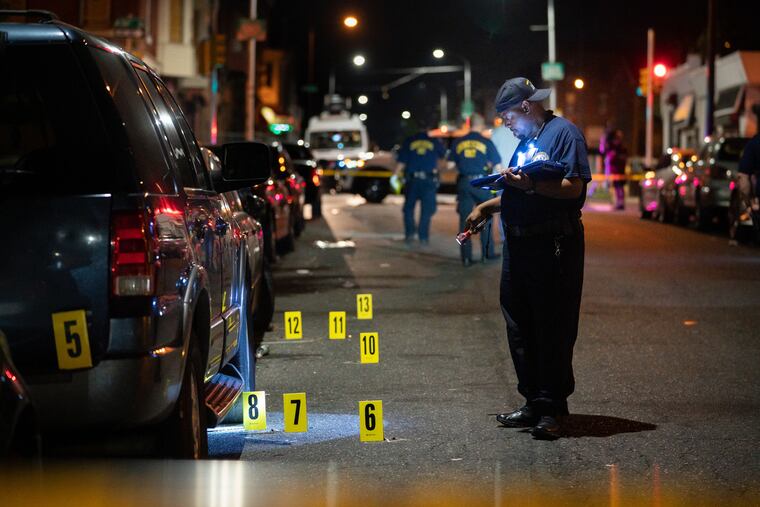Philly just hit 300 killings this year, as its record pace continues
This is the earliest in the year that the city has even approached 300 killings since at least the early 1990s. And shootings have topped 1,200.

Late Thursday night, someone opened fire on a North Philadelphia street and shot three people. One died: the city’s 300th homicide victim of 2021.
Police did not identify the man who died, and released few details about the crime, which they said happened on the 1800 block of West Susquehanna Avenue around 11:30 p.m. The other victims, authorities said, were a 14-year-old girl shot in the chest and a 24-year-old man struck in the shoulder. Both were hospitalized Friday, the girl in critical condition.
The fatal shooting meant that the city had reached 300 killings more quickly in a single year than any since at least the 1970s. And it kept Philadelphia on pace to top not only last year’s 499 homicides, but also its all-time record of 500 slayings in a year, set in 1990.
Police Commissioner Danielle Outlaw said in a statement that “the brazenness with which these assaults are carried out is appalling. The lack of regard for human life is affecting innocent bystanders and our children are being caught in the cross fire.”
Outlaw said that officers were continuing to seize illegal guns in record numbers, and that police remained “laser-focused on enforcing the law while deterring crime,” while pledging that police would continue to seek partnerships with other agencies and community members “to effect long-term and sustainable change.”
The incident on Susquehanna Avenue was one of at least three shootings that night, according to police. In all, six people were wounded or killed.
Chief Inspector Scott Small told reporters at the scene that unidentified gunmen fired toward houses on the block and the teen was struck by stray bullets as she was on her front porch.
By Friday morning, the neighborhood had drawn police and antiviolence activists, some of whom held signs denouncing shootings and speaking through a bullhorn to neighbors and passing motorists. The street was littered with dark tinted glass from the windows of a black SUV that was hit during the gunfire.
Andrew Carter Bey, 22, who lives in the neighborhood, said the girl who was shot had been a babysitter at times for his 7-year-old brother.
He and his mother, Mia Carter, 47, lamented the danger that such violence poses for people who live there — including children. Bullets had pierced two first-floor windows of their home, one in the front, the other on the side of the house.
“It’s hard to deal with,” Carter said, standing at her front door. “I couldn’t even go to work today, I was so distraught.”
Her son said: “This is not a safe environment if 14-year-old girls are being shot. No, it’s not. They could have killed my mom.”
Carter said she often hears gunshots in the neighborhood, and she does not feel safe. She said she called 911 after Thursday’s gunfire, but that the phone rang and rang without a response. “Right now I don’t know what my options are,” she said. “I’m scared.”
Leroy Muhammad, an activist with the Black Male Community Council, was among those speaking out Friday. He told those listening that they as community members needed to step up to help stop the violence and help the authorities catch those committing violent acts.
“We don’t come out here as a follow-up response. We’re out here every day, this is what we do. We’re out in the streets every day and we’re looking for others to come out with us,” Muhammad said. “I woke up this morning, only to find that there had been 300 homicides in Philadelphia. Totally ridiculous. Unacceptable.”
Jamal Johnson stood on the block holding a sign that said, “Stop Shooting People.” On Aug. 9, he said, he plans to lead a march that will start at Philadelphia’s City Hall. It will end, he said, 19 days later in Washington, where he and others plan to meet with members of the Congressional Black Caucus and ask their help in combating violent crime in cities across the country.
“First and foremost, I think Mayor [Jim] Kenney has got to declare gun violence in the city is an emergency, and that it needs to be given emergency attention. Not just the cavalier attention that it has received so far,” Johnson said.
“Secondly, the community has got to get involved. We’re living with this every single day, so we have to get involved,” he said.
The last time the city logged 300 homicides by the summer was in the 1990s, according to department statistics. Still, even in that decade, the earliest the city reached the bleak milestone was in 1990, when the 300th slaying was recorded on Aug. 3.
Already this year, more than 1,200 people have been shot citywide, police statistics show — 24% more than through the same date last year, and more than were shot in all of 2017. Of them, 259 have died, the statistics say.
July has been marked by an even more alarming surge. In the first 14 days of this month, police statistics show, 135 people were shot, including 11 children.
Friday afternoon, the violence continued: Police said a 28-year-old woman suffered a graze wound when she was struck by a bullet on Old York Road and Lycoming Street in Hunting Park.
Staff writer Dylan Purcell contributed to this article.